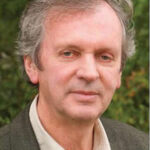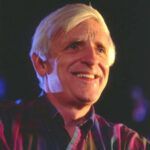
Graphic and composite by New Dimensions
Biologist Rupert Sheldrake’s scientific explorations and understanding of the non-local mind that connects all of us (morphic fields) constitute a sweeping challenge to the very fundamentals of established science. He believes and demonstrates that our minds are not limited to our brains, but rather stretch outward to touch the beings and objects that we perceive. Listen to this seminal scientist in these five programs specially selected from the New Dimensions program archive.
 The Past Is Present
The Past Is PresentSheldrake’s theory of “morphic resonance” challenges some fundamental assumptions of established science. He offers a revolutionary alternative to the mechanistic worldview and points toward a new understanding of the nature of life, matter and mind. He suggests that the brain may be more like a tuning system than a recording device. Read more »

 Angels: Where Science Fears To Tread
Angels: Where Science Fears To TreadHow does modern physics parallel and transform the concept of angels? How did a split between science and spirit come about and how are the two being reconnected? What is the importance of wonder and awe in scientific study? The answers to these and many other questions are explored in this dynamic conversation between a scientist and a theologian/priest. Read more »
 Everyday Miracles
Everyday MiraclesHave you wondered how your cat or dog seems to know when you’re coming home? Sheldrake, one of the most innovative scientists of our time, believes that all self-organizing systems (including human society) have invisible fields within and around them which shape and mold their development. He calls them “morphic fields” and gives ideas for experiments you can do at home. Read more »
 Science Set Free
Science Set FreeBritish biologist Rupert Sheldrake asks questions that most scientists haven’t thought of, or have been discouraged from asking. He is best known for his morphic field theory, which explores aspects of reality that are unexplained in terms of current physics. In this talk, he proposes setting science free from its most constricting dogmas and unexamined assumptions. Read more »